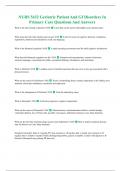NURS 5432 Geriatric Patient And GI Disorders In
Primary Care Questions And Answers
What is the mini mental evaluation? ANS A tool that can be used to thoroughly assess mental status.
What areas does the mini mental exam assess? ANS It test five areas of cognitive function: orientation,
registration, attention and calculation, recall, and language.
What is the Montreal cognition? ANS A rapid screening assessment used for mild cognitive dysfunction.
What does the Montreal cognition test for? ANS Attention and concentration, executive functions,
memory, language, vasoconstriction skills, conceptual thinking, calculations, and orientation.
What is Delirium? ANS A sudden onset of clouded sensorium that can occur at any age associated with a
physical stressor.
What are the causes for Delirium? ANS Toxins, alcohol/drug abuse, trauma, Impactions in the elderly, poor
nutrition, electrolyte imbalances, anesthesia and septicemia.
What is the management of Delirium? ANS Treat the underlying cause
What is Dementia? ANS A chronic progressive cognitive impairment
What are the causes of Dementia? ANS Atherosclerosis, neurotransmitter deficits, cortical atrophy,
ventricular dilation, loss of brain cells, possible viral causes, Alzheimer's disease, Lewy body dementia
What are the first line treatment drugs used to treat Alzheimer's? ANS Best in mild to moderate disease;
may be effective in Lewy body dementia.
Donepezil (Aricept): Start at 5 mg/day PO; may increase to 10 mg/day after 1 month, may increase to 23
mg/day after 3 months if needed. Orally disintegrating tablets; generic available. Caution with digoxin or β-
blockers (Donepezil may prolong PR interval.)
, Rivastigmine (Exelon): Start at 1.5 mg PO BID and increase by 1.5 mg BID every 2 weeks; maintenance 6 to
12 mg/day total Capsule, solution, or patch (reduced side effects)
Galantamine (Razadyne): Start at 4 mg BID for 4 weeks and then increase by 4 mg BID every month with goal
of 16 to 24 mg/day dose.
Tablets, solution, extended-release (ER) capsule, and transdermal formulations
Vitamin E—2,000 IU/day supplementation was found to slow decline in one study.
Memantine, a N-methyl-d-aspartate (NMDA) receptor antagonist for moderate to severe AD
Monotherapy or in combination with acetylcholinesterase inhibitors, Memantine immediate release: 5 mg/day;
titrate up to 10 mg BID, adding 5 mg/day every week PRN.
Memantine extended release: 7 mg/day up to 28 mg/day, adding 7 mg/day every week PRN
What type of inhibitors are used to treat Alzheimer's ANS Acetylcholinesterase Inhibitors (ChEIs)
What are the side effects of Alzheimer's drugs? ANS All have potential for GI and other side effects, such
as bradycardia/syncope.
Neuropsychiatric symptoms: assessment and treatment for delirium, environmental modification, sleep
hygiene, exercise, cognitive interventions, hearing/vision aids, and if necessary for moderate to severe
symptoms, consider second-line care
What are the second line drugs used to treat Alzheimer's? ANS For moderate to severe depression:
selective serotonin reuptake inhibitors (SSRIs) preferred
Insomnia: Medications have little efficacy for sleep in AD.
Avoid diphenhydramine and antihistamines in elderly due to negative side effects.
If using low-dose risperidone, trazodone, or sleep aid (e.g., zolpidem), use caution and lowest dose possible in
elderly.




